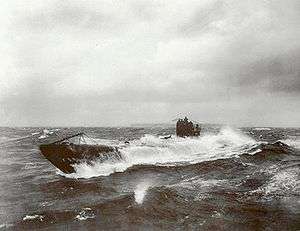SM UB-71
SM UB-71 was a German Type UB III submarine or U-boat in the German Imperial Navy (German: Kaiserliche Marine) during World War I. She was commissioned into the German Imperial Navy on 23 November 1917 as SM UB-71.[Note 1]
 UB-148 at sea, a U-boat similar to UB-71. | |
| History | |
|---|---|
| Name: | UB-71 |
| Ordered: | 20 May 1916[1] |
| Builder: | Friedrich Krupp Germaniawerft, Kiel |
| Cost: | 3,276,000 German Papiermark |
| Yard number: | 289 |
| Launched: | 12 July 1917[2] |
| Commissioned: | 23 November 1917[2] |
| Fate: | sunk 21 April 1918 by depth charges off Menorca (35°58′N 5°18′E) by British warship, 32 dead[2] |
| General characteristics [2] | |
| Class and type: | German Type UB III submarine |
| Displacement: |
|
| Length: | 55.83 m (183 ft 2 in) (o/a) |
| Beam: | 5.80 m (19 ft) |
| Draught: | 3.67 m (12 ft 0 in) |
| Propulsion: |
|
| Speed: |
|
| Range: |
|
| Test depth: | 50 m (160 ft) |
| Complement: | 3 officers, 31 men[2] |
| Armament: |
|
| Service record | |
| Part of: |
|
| Commanders: |
|
| Operations: | 1 patrol |
| Victories: | None |
UB-71 was serving in the Mediterranean when she was sunk by depth charges from HMS ML413 off Menorca on 21 April 1918.[2]
Construction
She was built by Friedrich Krupp Germaniawerft of Kiel and following just under a year of construction, launched at Kiel on 12 July 1917. UB-71 was commissioned later that same year under the command of Kptlt. Kurt Schapler. Like all Type UB III submarines, UB-71 carried 10 torpedoes and was armed with a 8.8 cm (3.46 in) deck gun. UB-71 would carry a crew of up to 3 officer and 31 men and had a cruising range of 9,090 nautical miles (16,830 km; 10,460 mi). UB-71 had a displacement of 513 t (505 long tons) while surfaced and 647 t (637 long tons) when submerged. Her engines enabled her to travel at 13.2 knots (24.4 km/h; 15.2 mph) when surfaced and 7.6 knots (14.1 km/h; 8.7 mph) when submerged.
References
Notes
- "SM" stands for "Seiner Majestät" (English: His Majesty's) and combined with the U for Unterseeboot would be translated as His Majesty's Submarine.
Citations
- Rössler 1979, p. 28.
- Gröner 1991, pp. 25-30.
- Helgason, Guðmundur. "WWI U-boat commanders: Kurt Schapler". German and Austrian U-boats of World War I - Kaiserliche Marine - Uboat.net. Retrieved 8 March 2015.
Bibliography
- Bendert, Harald (2000). Die UB-Boote der Kaiserlichen Marine, 1914-1918. Einsätze, Erfolge, Schicksal (in German). Hamburg: Verlag E.S. Mittler & Sohn GmbH. ISBN 3-8132-0713-7.CS1 maint: ref=harv (link)
- Gröner, Erich; Jung, Dieter; Maass, Martin (1991). U-boats and Mine Warfare Vessels. German Warships 1815–1945. 2. Translated by Thomas, Keith; Magowan, Rachel. London: Conway Maritime Press. ISBN 0-85177-593-4.
- Rössler, Eberhard (1979). U-Bootbau bis Ende des 1. Weltkrieges, Konstruktionen für das Ausland und die Jahre 1935 - 1945. Die deutschen U-Boote und ihre Werften (in German). I. Munich: Bernard & Graefe. ISBN 3-7637-5213-7.CS1 maint: ref=harv (link)